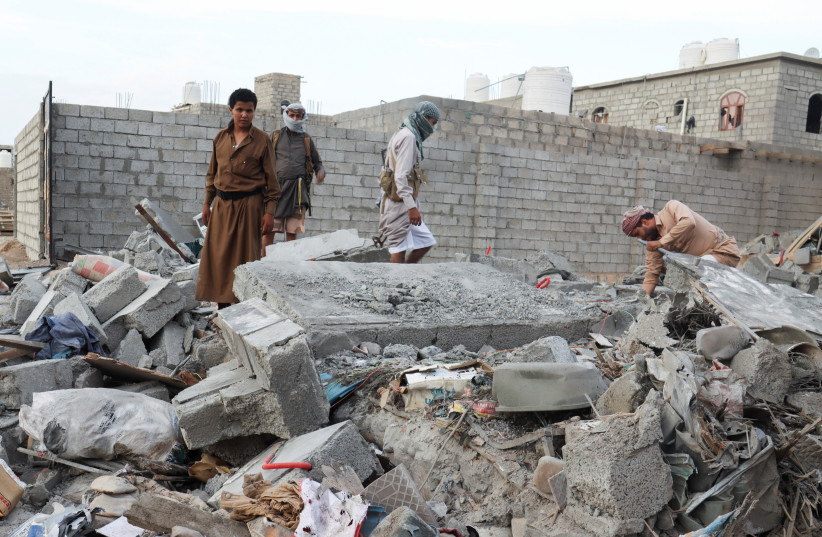Both sides in the Yemeni civil war have used sports as an element of military strategy—both by recruiting athletes to fight and by taking advantage of the sports infrastructure that existed in the country for their own purposes. Despite this history, athletes for Yemen’s national teams say that sports can be used as a way to create unity in the country as well.
For more stories from The Media Line go to themedialine.org
The Yemeni civil war broke out in 2014 when the Houthis, a mostly Shiite Islamist movement, took over Yemen’s capital and ousted President Abdrabbuh Mansur Hadi. A Saudi-led coalition launched a military intervention following the coup. The war has been ongoing for almost nine years, and the UN has described the resulting humanitarian crisis in Yemen as among the worst in the world.
Some Yemeni athletes have been participating in the war since it first broke out, whether by choice or due to forcible recruitment. Some athletes have been killed in the conflict and others have been left severely disabled.

Abdul-Jabbar Al-Edrisi, who played soccer for Yemen’s national team and for the Al-Shaab Sanaa soccer club, was killed fighting for the Houthis in Al Hudaydah, a governorate in western Yemen.
Al-Edrisi’s close friend Mohammed Al-Radami told The Media Line that Al-Edrisi began fighting for the Houthis in 2016 after the rebel group took over the Al-Shaab Sanaa soccer club. The Houthis “imposed a management team that’s loyal to them, in addition to forcefully holding seminars and events promoting the Houthis ideology in the club,” Al-Radami said. A statement released on Martyrs’ Day from Mofadhal Ahmad Mofadhal, manager of the Al-Shaab Sanaa soccer club, said that six players from the club, including Al-Edrisi, had been killed in armed confrontations. Six athletes from other teams also died fighting for the Houthis.
“We are proud of these heroes who performed their heroic acts in stadiums and on battlefields to defend their homeland,” Mofadhal said in the statement. Dozens of Yemeni athletes have also died fighting for the internationally recognized government, including Abdullah Aref, who was goalkeeper for the national team and the Al-Shula soccer club.
Destruction of Yemeni sports
Both the internationally recognized government and the Houthis have destroyed Yemeni sports in an attempt to gain military power, Yemeni journalist Saddam Mohammad told The Media Line. “The Houthis, for example, contributed to the destruction of Yemeni sports by disrupting the role of sports federations and canceling sport activities,” Mohammad said. “They transformed stadiums and sports facilities into weapon depots, training camps, and graveyards for their dead fighters, such as Althawra stadium, the indoor sport hall, and Yemen’s Football Federation
building in Sana’a.”
He noted that the Houthis and the internationally recognized government used not only physical sports infrastructure but also the sentiment around sports to prop up their ideologies. “The Houthis used sporting events to introduce their ideas, and the same thing is being done by the internationally recognized government,” Mohammad said.
Ali Atiq, who works for the internationally recognized government’s Ministry of Youth and Sports, told The Media Line that although sports in Yemen were severely damaged by the war, sports can still be a tool to help rebuild the country.
He noted that participation in sports dropped 88% because of the civil war. But a few athletic events that did take place “showed the ability of sport to create opportunities for rebuilding the torn social fabric and its ability to promote opportunities for coexistence and peace,” Atiq said.
Former captain of Yemen’s national soccer team Ali Al-Nono said that sports can be used as “a means to mend the rifts created by politics and war in Yemen.” “Yemeni athletes were the first to send a message of unity even before it happened in Yemen between the south and the north,” he told The Media Line. Ibrahim Abdulaziz, who plays for Yemen’s national tennis team, also emphasized the power of sports to restore societal cohesion.
“Sport is one of the most important methods and tools that will contribute to strengthening community bonds that were torn apart due to the war,” he told The Media Line. He said that Yemeni love for sports can allow people to overcome “political and sectarian differences.”
Sports commentator Hassan Al-Aidarous, who works for the Qatari beIN Sports network, said that players and fans have to do their part in order for sports to be something that brings society together.
“Sport contributes effectively to spreading the culture of peace among people of the same country or even different countries and races, provided that we practice it morally, show sportsmanship, and accept the loss without fueling and sowing hatred and racism,” he told The Media Line.
